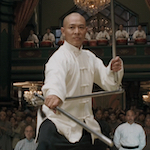 “First level is the physical contact. Use your physical skill against your enemy. That’s most action films doing this kind of genre. The second level is use your knowledge, languages, strategy, everything you could before physical contact to stop your enemy. Third, use your honor, belief, your love, show to your enemy. Turn your enemy into your friend. I tried to share those three levels in the movie.” —Jet Li on FEARLESS
“First level is the physical contact. Use your physical skill against your enemy. That’s most action films doing this kind of genre. The second level is use your knowledge, languages, strategy, everything you could before physical contact to stop your enemy. Third, use your honor, belief, your love, show to your enemy. Turn your enemy into your friend. I tried to share those three levels in the movie.” —Jet Li on FEARLESS
After the success of FREDDY VS. JASON, it seemed like Yu might continue his relationship with New Line Cinema, making the sort of slick studio b-movies both parties were pretty good at in those days. As I mentioned in my review of THE 51ST STATE, Samuel L. Jackson tried to reteam with the director for the company’s weirdly anticipated goof SNAKES ON A PLANE. But Yu believed Jackson’s star power would outshine the snakes, so he wanted his character to be swallowed by a python in the middle of the movie.
 “Now the audience is intrigued. Now everyone on the plane will group together and kill the snakes,” he later told Blackfilm. “That’s the way I thought it would be interesting. Of course, they said ‘Take a walk!’”
“Now the audience is intrigued. Now everyone on the plane will group together and kill the snakes,” he later told Blackfilm. “That’s the way I thought it would be interesting. Of course, they said ‘Take a walk!’”
So walk he did – all the way to Shanghai, China. And there he met up with Jet Li, a fellow Hong Kong cinema export who’d made even more of a go of it in Hollywood than Yu had. Since the handover Li had been the villain in LETHAL WEAPON 4 and then starred in the English language films ROMEO MUST DIE, KISS OF THE DRAGON, THE ONE, CRADLE 2 THE GRAVE and UNLEASHED. (He had also made 2002’s HERO in China, so this was not his official return to Asia like it was for Yu.)
FEARLESS (2006) is sometimes called JET LI’S FEARLESS, and it is in fact the martial arts star’s passion project. Written by Wang Bin & Li Feng (HERO, HOUSE OF FLYING DAGGERS), Chris Chow Chun (THE KING OF FIGHTERS) and Christine To Chi-Long (TRUE LEGEND), the project was initiated by Li, and intended as his ultimate statement on wushu (Chinese martial arts). It was widely promoted as his last martial arts film, though what he meant was his last movie specifically about real wushu. He would go on to appear in several more with fantastical elements like monkey kings, flying swords, and Expendables.
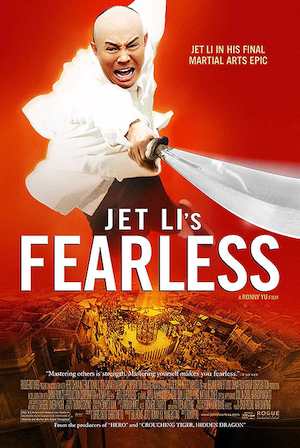 Li stars as Huo Yuanjia, a real life martial artist (1868-1910) who had already been portrayed in many movies and TV shows, including as the master of the fictional character played by Bruce Lee in FIST OF FURY and Li himself in FIST OF LEGEND. The real Huo Yuanjia is legendary mainly for defeating foreign fighters in exposition matches at a time when China was desperate for things to be proud of. The international version of FEARLESS begins with him fighting an English boxer (Jean Claude Leuyer, WILD CARD), a Belgian fighter (Brandon Rhea, SILVER HAWK) and a Spanish swordsman (Anthony De Longis, ROAD HOUSE, MASTERS OF THE UNIVERSE), then flashing back through his whole life before a final match. But let’s follow the director’s cut, which is re-ordered and 35 minutes longer. That version saves the matches for the end and begins with a destitute Yuanjia traveling on a boat before pulling the Dewey Cox and jumping back to his childhood (when he’s played by Yuhao Lu).
Li stars as Huo Yuanjia, a real life martial artist (1868-1910) who had already been portrayed in many movies and TV shows, including as the master of the fictional character played by Bruce Lee in FIST OF FURY and Li himself in FIST OF LEGEND. The real Huo Yuanjia is legendary mainly for defeating foreign fighters in exposition matches at a time when China was desperate for things to be proud of. The international version of FEARLESS begins with him fighting an English boxer (Jean Claude Leuyer, WILD CARD), a Belgian fighter (Brandon Rhea, SILVER HAWK) and a Spanish swordsman (Anthony De Longis, ROAD HOUSE, MASTERS OF THE UNIVERSE), then flashing back through his whole life before a final match. But let’s follow the director’s cut, which is re-ordered and 35 minutes longer. That version saves the matches for the end and begins with a destitute Yuanjia traveling on a boat before pulling the Dewey Cox and jumping back to his childhood (when he’s played by Yuhao Lu).
Yuanjia’s father Huo Endi (Collin Chou, KUNG FU CULT MASTER) is a renowned martial arts teacher and competitor, but he won’t teach Yuanjia because the kid has asthma. Similar to Li’s TAI CHI MASTER, he and a friend spy on the lessons and try to learn the moves they’re not supposed to. Similar to Yu’s WARRIORS OF VIRTUE, they get bullied. Yuanjia brags about Huo wushu being the best right before his dad loses a match against Master Zhou (Zhigang Zhao, THE KING OF MASKS) by holding back what could’ve been a fatal blow. Yuanjia feels so humiliated he cries, and then he gets challenged by Zhou’s little prick son and loses. He comes home with more than the traditional black eye – his face is leaning toward BRIDE OF CHUCKY battle damaged doll.
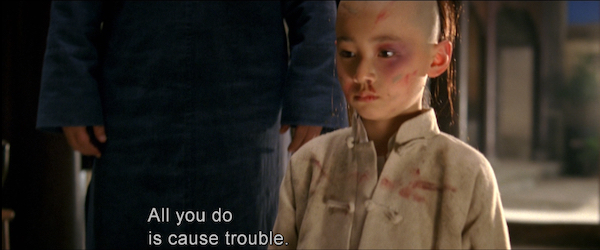
Even then his dad asks his servant Lai (Ting Leung) to whip him as punishment for fighting! Mom (Paw Hee-ching, BULLET IN THE HEAD) talks him out of it.
After studying his dad’s secret scrolls he wins a rematch against li’l Zhao, and through a decades-spanning cut becomes a proud Jet Li. Grown up Yuanjia is the master of the palace now, a widower, and father to a cute daughter named Jade (Xu Ailing). He’s still living with his mom, still winning fights and “building up the family reputation.” He beats a guy in the rain while holding an umbrella in one hand, defeats two swords with one wooden club, invites something like 15 waiting challengers onto the platform at once to get it over with. We’re told he’s won 38 fights in a row, including a rematch against grown up Zhou (Scott Ma, CROUCHING TIGER, HIDDEN DRAGON). So nobody can fuck with him. His dad is dead, and he goes to his shrine and says, “Your fist wasn’t fast enough, and your heart wasn’t hard enough. As long as I live, the Huo clan will never lose again!” What an asshole!
He’s still bros with his childhood nerd friend Jinsun (Dong Yong, THE LOST BLADESMAN), who owns the fancy Guyue Restaurant. Jinsun is more modern than him – he wears ties and drinks coffee (which Yuanjia thinks is gross) – but he worries about the future of China.
It’s kind of a ROCKY III situation where he’s gotten too famous and undisciplined. He has a ton of followers because everybody wants to hang with the champ, and he likes to go out drinking and pick up everybody’s tab. Jinsun is having a hard time cutting him off even though he’s way in the hole. Also his wife and kid wait at home sad that they don’t see him much. If this were an American movie he would definitely miss Jade’s music recital or Little League game.
The Clubber Lang who comes gunning for him is Master Chin (Chen Zhihui, WING CHUN, IP MAN), via his godson (Jacky Heung, TRUE LEGEND), who we see in the crowd of another fight giving Yuanjia a look of hatred that could melt an iceberg. Our guy seems afraid to fight Master Chin, but knows he’s a phony calling himself “Champion of Tianjin” until he does. It makes him so jealous he takes it out on his disciples, beating them up under the guise of training. But when he finds out Master Chin beat up one of his disciples in town, he finally blows up, going to confront Chin at the restaurant by sitting at a reserved table surrounded by his entourage in all black, performatively drinking cup after cup of sake, and telling Chin’s godson “You don’t qualify to speak to me” when he tries to calm him down.
A couple important facts:
1. Master Chin is there with his family celebrating his birthday. Ice cream cake and everything. (Okay, I made up the cake.)
2. Yuanjias’s life long friend Jinsun begs him not to do this in front of the guests. And what really hurts is when Yuanjia says it doesn’t matter if he “trashes the place” because “I’ll pay for the damages.” (Motherfucker, your overdue bar tab is bigger than most people’s student loans.)
So everybody else goes outside and they duel inside the restaurant with huge swords, causing sparks, slicing through columns, banners, banisters, crashing all the way through floors and walls. He drags Master Chin’s head through a row of ceramic wine jugs (like Jason dragging Freddy’s head through those windows), rips his shirt off, punches him so hard in the collar bone that his shoulder bones protrude form his back.
We get a moment of quiet, surveying wine dripping across the wreckage before Yuanjia opens the doors and leaves the restaurant. His disciples mob him in celebration, completely oblivious to how non-triumphant he looks.
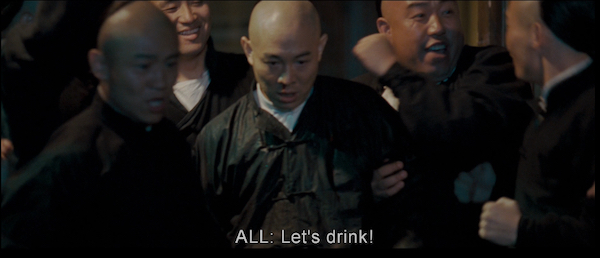
After Master Chin’s people carry him out, severely injured, Yu shows us his godson watching the silhouettes of Huo’s guys celebrating in the windows across the street.
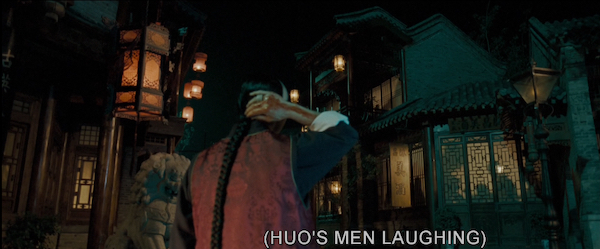
When Yuanjia stumbles home in a daze (from the alcohol, or from the guilt?) the sun is coming up and the wreckage from the fight is still being cleared. Reminds me of the day after the riot in DO THE RIGHT THING. Jinsun is in a window (like Mother Sister) to sarcastically congratulate him on being Champion of Tianjin and inform him that Master Chin died two hours ago. And then he goes home and finds his daughter and mother murdered.
He goes straight to Chin’s godson, who immediately says, “Yes, I killed your family. I am responsible.” So Yuanjia slashes his throat right in front of his crying godmother (He Sirong) and sister (Ma Yin), before realizing they’re mourning next to the body of Master Chin. Their other loved one that he killed. He drops the sword.
And as he’s leaving one more thing happens to put a toothpick in this shit sandwich of a day. No, it’s not that thing where there’s a sudden thunder clap and it starts pouring rain. No, his disciples find him to tell him that when Master Chin beat up that disciple it was defending his honor ‘cause the guy got drunk and insulted his concubine. Cinematographer Poon Hang Sang (ONCE A THIEF, THE 51ST STATE, KUNG FU HUSTLE)’s camera rotates around Yuanjia’s head as he can only wobble it from side to side and laugh crazily. That’s how he became The Joker.
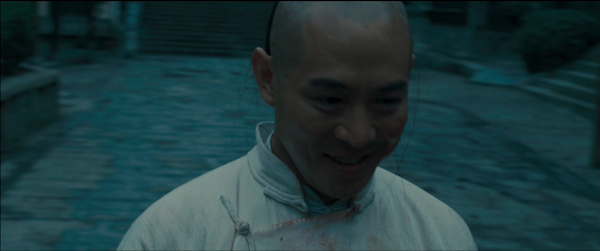
He walks out of town and it dissolves to that boat from the beginning of the movie. Next thing you know he’s a sad man sporting years-long hair and beard, walking the earth in rags, his feet wrapped in bloody bandages. After a suicidal dive into a river he wakes up in a small village, being nursed to health by a nice blind woman named Moon (Sun Li, SHADOW) and her Grandma Sun (Qu Yun, INTREPID HERO) in a humble cottage. Moon feeds him, cleans him, shaves him, cuts and braids his hair, gives him clothes. He doesn’t talk, and he sleeps all day, so Moon’s younger brother Gui (Wang Qi) names him “Ox” after his ailing ox Yellow. Yellow is a tragic character because even though he’s dying and can barely walk he goes out into the field and tries to plow.
The newly christened Ox wants to be useful like that, so he helps plant the crops, working really hard, but fucking up and planting them too close together. Moon doesn’t want to tell him, but Gui drags him over to see her redoing his work and says, “Look, you did a bad job!” When Moon explains that the plants have to give each other space, just like people have to respect each other to live peacefully, he says his first words to her: “I’ll always remember.”
The director’s cut has a big sequence that’s not in the shorter cut, where Gui, upset by the death of Yellow, is caught trying to steal an ox from a neighboring village. They tie him up and cane him until his village shows up to free him. Grandma Sun apologizes for him, but “According to our village rules, if a child makes a mistake then all the children of the village can beat him until the incense stick burns out.”
Our boy Huo “Ox” Yuanjia insists on taking Gui’s place, but since he’s an adult they work out a deal for him to be beaten by their best Muay Thai fighter (Somluck Kamsing, BANGKOK REVENGE, A PRAYER BEFORE DAWN). Ox takes a barrage of hard kicks, punches and knees to the head, but the villagers can’t stand watching and start to revolt. Ox stops them and switches to a new strategy: dodging and blocking all the hits, even doing a defensive throw and catching the Thai boxer with a foot before his face hits the ground. Ox is still standing, so the boxer bows and lets them go.
This crucial Ox chapter of Huo Yuanjia’s life (which Moon describes as “so many years”) ends when his hosts are talking about visiting the graves of their loved ones, and he decides he needs to do the same. But they’re buried far away. Before he leaves he promises to return and tells Moon his real name. She smiles and says, “I’ll always remember.”
When he returns home, China has been invaded and Tianjin is a semi-colony crowded with people of different nationalities, some of them with Bibles or camels. His home is dilapidated, but still standing, overseen by Lai, who took care of him when he was little and still calls him “Young Master.” Yuanjia solemnly says, “It must’ve been hard for you,” proving he’s not the same prick he was back then. Further cementing this point, he pulls down the death waivers that represent each of his and his father’s wushu victories and burns them.
“I don’t need these anymore. Neither do my parents.” At his father’s grave he doesn’t insult his punching, he apologizes and tells him what he’s learned. Then he apologizes to Mrs. Chin and to Master Chin’s shrine, and begins to make peace by giving the Hou wushu scrolls to his old rival Zhou. He goes to Jinsun, says he doesn’t expect forgiveness, but asks for help organizing a match against the gargantuan U.S. champion and anti-Chinese shit-talker Hercules O’Brien (Nathan “I had a baby brother and he was perfect in every way” Jones, THE PROTECTOR, MUAY THAI GIANT).
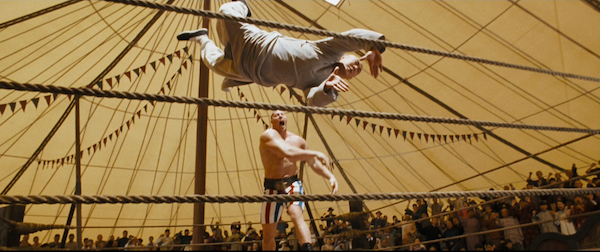
So the last 40 minutes of FEARLESS are about what the real Huo Yuanjia is most famous for: fighting exhibition matches against foreign fighters, not for the glory of his family but the unity and pride of all Chinese people. At the Hercules O’Brien fight, when presented with the death waiver, he says, “Please inform him that taking a life in competition is a cruel and backward Chinese tradition. May I suggest we compete with honor and civility?”
And he does. Seeming to win the fight, he shows his respect before starting to leave, and Hercules attacks him again. Yuanjia flips the behemoth over the ropes but possibly saves his life by catching his head with his foot before it hits a row of spikes protruding from a broken part of the ring. Now they both bow and Hercules raises Yuanjia’s arm in victory.
Yuanjia calls for all martial artists to unite, and founds the Jingwu Sports Federation with the help of Jinsun (who forgives him even before learning he’s sober). It begins to feel more propaganda-y when they talk about how the West belittles China because they’re not united. Or maybe it’s just corny. But he says that during his time away he came to the conclusion that “Only weak people will show their power through violence,” so he wants to turn wushu into a sport. You still get to build character by learning it but then you don’t, like, beat a guy to death on his birthday, kicking off a series of revenge killings.
I love when Master Zhao shows up at the Hou residence and they both act like they’re old friends, not old enemies. Fight brothers. Dae Han in BEST OF THE BEST 2 type shit. Instead of trying to defeat all the masters he invites them all over. Once the organization is rolling, “all disciplines are respected equally” and “we influence others through cooperation, not intimidation.”
Finally, he agrees to those four matches against different nations, even knowing they’re an attempt to undermine the federation. It’s not a bitter ROCKY IV type situation, because he meets and has tea with the undefeated Japanese champion he’s going to fight, Anno Tanaka (Nakamura Shidou, LETTERS FROM IWO JIMA, RED CLIFF), and impresses him with his philosophy that competition is not to prove the superiority of a style, but to discover your own weaknesses. And since Yuanjia has to fight four people in a row, Tanaka tells him before the match that it’s unfair and offers to fight at a different time. (He declines, of course.)
It’s a great fight, with a tied first round. In the second round Yuanjia pukes up blood, because some motherfucker poisoned his tea. But having learned from that mess he caused before he became an ox for a while, he tells his friends, “We must not seek revenge. Revenge only brings more bloodshed. That’s not what I want. We must strive to better ourselves.” He accepts his death and finishes the match. It’s some real beautiful melodrama, with honorable Tanaka trying to end the fight, then promising not to hold back when Yuanjia wants to continue. Most of the round plays out with only music, no sound, making it seem extra vicious. And he honors his father by holding back the punch that killed Master Chin. Then he drops. Tanaka defiantly helps him up and declares him the winner. As Yuanjia dies laying in the ring, he smiles, looking up through the skylight at the stars. Ghostly images of his outdoor wushu practice imply that his spirit is somehow returning to Moon, who senses his presence in the wind.
The key collaborator on FEARLESS who I haven’t mentioned is the legendary action choreographer Yuen Woo-ping, who, like Yu and Li, had swerved into some western productions in recent years (THE MATRIX, KILL BILL, UNLEASHED with Li). Yuen had done seven previous movies with Li, dating back to ONCE UPON A TIME IN CHINA (1991), but had only worked with Yu once, way back in 1982, on THE POSTMAN STRIKES BACK (IMDb lists him as production supervisor and planner).
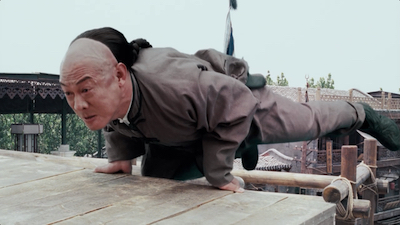 Though the action is a little more grounded than, say, the ONCE UPON A TIME IN CHINA series or CROUCHING TIGER, HIDDEN DRAGON, Yuen’s spectacular style is unmistakable. They can’t fly, they don’t run across people’s heads, but there’s still some wire assisted physics defiance, cartoonish destruction, and exaggeration like almost falling off the platform but landing in plank formation on the very edge.
Though the action is a little more grounded than, say, the ONCE UPON A TIME IN CHINA series or CROUCHING TIGER, HIDDEN DRAGON, Yuen’s spectacular style is unmistakable. They can’t fly, they don’t run across people’s heads, but there’s still some wire assisted physics defiance, cartoonish destruction, and exaggeration like almost falling off the platform but landing in plank formation on the very edge.
One thing that makes FEARLESS a great fight movie is that there’s such a variety to its many face offs. My favorite is the deadly challenge fight in the restaurant, but you also have the competition fights in different settings (the stone platform in the town square, the elevated wooden platform, the boxing ring and big yellow circus tent where he fights Hercules, an entirely different venue for the finale), plus the defensive fight in the village against the Thai boxer. Li also uses many different disciplines, from kung fu to fencing to the great three-section-staff vs. katana fight with Tanaka, and the Hercules fight has fun exaggerating the already ridiculous size difference between the two fighters. (Yuanjia has to figure out how to fight someone he can’t possibly overpower, much like Freddy fighting Jason.)
Even with all this, one of the highlights is before the final matches when we just see Yuanjia practicing by himself in a field, his braid swinging and shirt billowing dramatically, in slow motion so we can really examine his movements. In this scene Yuanjia has come to a new understanding of the meaning of wushu, and Li is joyously sharing the fruits of a lifetime of training.
At the same time I think Yu is showing a hard-earned discipline in his cinematic style. At the time I felt it was subdued for him, lacking the bold visual strutting of THE BRIDE WITH WHITE HAIR or BRIDE OF CHUCKY. It’s light on the bright colors and gimmicky camera angles I love in some of his other work, with more focus on bringing a 21st century filmmaking scope and production value to kung fu movies that we really hadn’t seen outside of true epics like HERO. FEARLESS is very sincere and personal, but it’s a more playful type of martial arts movie than Zhang Yimou makes, couching its message in crowdpleasing entertainment more than beauty and grandeur. Not that there isn’t some of that, especially when he’s staying with Moon.
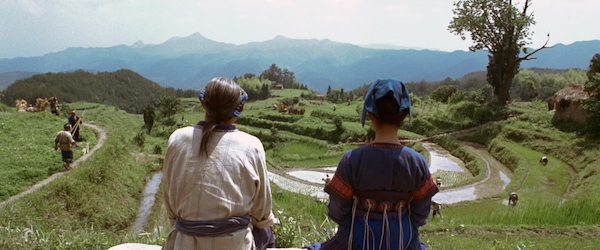
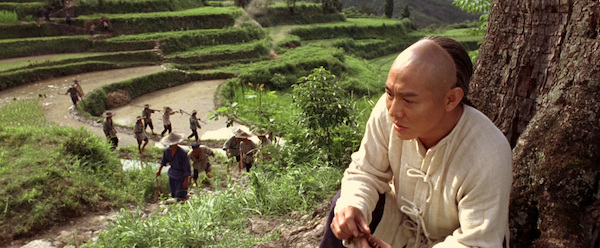
Yu achieves his style mostly by moving the camera fluidly, lots of spinning around people, lots of big crane shots sweeping across crowds and large, impressive sets – a look that I think is ahead of its time and may have inspired other 21st century Chinese historical epics like the IP MAN series. I can think of one moment that’s in that BRIDE OF CHUCKY show off mode, though: a brief shot of Yuanjia leaping and swinging his three-section staff, reflected in Tanaka’s eye.
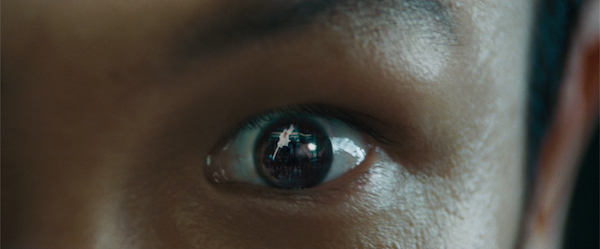
Huo’s real life grandson Huo Shoujin didn’t appreciate some of the fictionalization of his family history. At the age of 81 he filed a lawsuit against the producers and distributors because, according to his lawyer, “The films says Huo Yuanjia caused trouble that leads to the death of his mother and daughter, and as a result, he has no descendants. This is not true.” He asked for a public apology. But also to stop the worldwide release of the film. As you can see, he lost.
Yu was more interested in finding the meaning in the story than the true historical details. In an interview with Martial Arts Entertainment he said that when Li first approached him the project had a historically accurate script, “almost like TROY,” but it “didn’t feel right.” So he told Li
“The only reason you want to make a movie about Huo Yuan Jia is because you felt Huo Yuan Jia’s philosophy is so similar with yours. Then, that’s easy. Let’s just do a simple man’s journey through life… a simple human story – a misguided martial artist – he doesn’t see what is the goal in life. He just knows that winning with all means is the end to everything. Then he makes the biggest mistake of his life, and of course he tries to deny it. He tries to escape from his responsibility. He thought that was the way out. And then he finds enlightenment. From where? From something very basic. Mother earth. Farm. Peasants. Nature. And then he realizes there’s a lot more to life than just winning.”
The risky thing about that structure is that you can forgive him being a brat when he’s a kid, but then he grows up and until that “biggest mistake of his life” happens you’re watching a grown man who’s just as bad as he was as a kid, with worse consequences. There is one moment during his fight with grown up Zhou Jr. that suggests he has a conscience; when he knocks him off the platform, which is the point of the match, he reaches to try to catch him, yells “Be careful!,” and looks worried until he sees that he’s not seriously injured. But that seems to be the extent of his empathy at that point. Being the best fighter is about his only redeeming quality for the first 52 minutes of the movie.
The payoff, though, is a more profound statement about redemption and growth. You know – maybe you’ve been kind of a prick your whole life, maybe you’ve treated people badly, maybe you fucked your life over in some other way. Huo Yuanjia’s obviously not an everyman – most of us are not gonna be the best at some chosen pursuit like he is. But on the other hand, most of us aren’t gonna fuck up as bad as he did, getting his whole family and half of another family killed over some bullshit! Whatever level of failure we do have, FEARLESS tells us it’s not too late to drastically change our lives, and our philosophies, and bring something positive to the world. To change the essence of a person.
When I saw FEARLESS in the theater it ran 105 minutes. Although the 140 minute director’s cut has been on video for many years, I hadn’t watched it until now. I prefer the long version mainly for the encounter with the Thai boxer, which is not only a cool pacifistic fight scene, but an important story moment as it shows Yuanjia begin to transition from completely abandoning wushu to considering a different way to use it.
There’s something really goofy about the director’s cut, though. In 2009 I’d read that Michelle Yeoh was in FEARLESS, so when I realized she was only in the director’s cut I couldn’t believe they would do that. I assumed Yuanjia met her somewhere on his journey, so it was a shock to finally watch the longer version and realize her part is kinda like Bill Paxton’s in TITANIC – star of a wraparound story in the present day. She plays Miss Yang, a woman who gives a short speech to the International Olympic Committee about why wushu should be an Olympic sport. Not only is it only a cameo, not only is it a non-fighting role, but it’s barely an acting performance, since she’s mostly just reading a speech.
I understand how the scene fits the real Hou’s mission, but it’s so awkward, and I think lessens the impact of the film’s message by emphasizing the national pride part of it over the universal part. I take the “director’s cut” description at face value and believe Yu really wanted these scenes, but it’s the sort of cheeseball thing you imagine being added to a movie to please a censorial government.
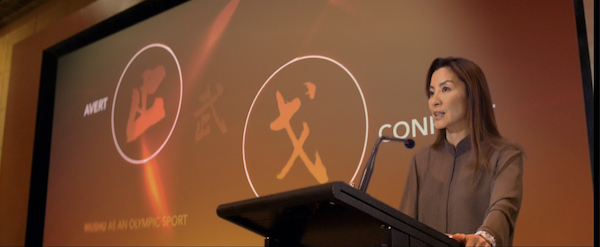
Which brings us to the very important question of what to make of this mainland Chinese production made by Hong Kongers who previously went to Hollywood fearing how Chinese rule would change their home industry. At a glance it does seem to bear out some of the worries of Hong Kong filmmakers before the handover. There’s nothing too bad about the heavy-handed message of Chinese unity except that it’s a conveniently government friendly one we see over and over in these 2000s mainland productions. These historical kung fu dramas are great (IP MAN and IP MAN 2 seem particularly indebted to FEARLESS), but the Hong Kong films of the ‘90s seem far more individualistic in retrospect. And when Yuanjia seems to disdain the cultural changes as much as any other aspect of colonialism it feels like a betrayal of the international world view displayed in previous Yu films.
But I honestly don’t think it’s a sellout propaganda movie. In every interview I’ve read, Yu seems passionate about returning the wushu genre to the idea of stopping conflict, rather than getting revenge. And there’s very little villainizing of foreigners. The American and Japanese opponents turn out to be very honorable, and the Japanese gambler who poisoned Yuanjia is called “a disgrace to Japan,” not a representative of them.
In fact Yu chose Japanese composer Shigeru Umebayashi (ZERO WOMAN: FINAL MISSION) to do the score. Maybe he didn’t think about that, since Umebayashi had experience in Hong Kong films, including some with Wong Kar Wai. But it was part of the director’s strategy to involve artists from outside Chinese culture.
Yu told Blackfilm that he and Li “didn’t just want to make a movie for the Asian audience because of the message. People all over the world can understand the message,” and therefore he intentionally chose two editors who did not speak Chinese. Australian Richard Learoyd (I, ROBOT) cut the action and American Virginia Katz (KINSEY) did the rest. “The reason why, and I had people tell me I was crazy, is that my theory is those two people, after they cut the movie and understood what it means, I crossed the barrier. The first battle is won.”
In an interview with Cinemontage, Katz confirms she was told Yu “wanted an American and a female as editor.”
So even in his first mainland Chinese production, telling the story of a Chinese national hero who preached Chinese pride and unity, Yu promotes an international, cross-cultural spirit. And it certainly doesn’t put me to sleep like the Spring Troupe’s propaganda play did to their audience in THE PHANTOM LOVER. I love this movie. And to me it’s not hard to say that it’s better and purer than most of the movies Yu and Li (but not Yuen Woo-ping) had been able to make in Hollywood.
p.s. It just occurred to me I don’t know why they called it FEARLESS internationally. The original title is the more sensible HUO YUANJIA.
p.p.s Even without the Michelle Yeoh scenes the spell of timelessness is broken by the end credits song “Fearless,” by actor/pop star Jay Chou. It combines traditional Chinese flutes and strings with electric guitars, scratching and rapping. Totally goofy but I sort of get a kick out of it.
Tomorrow: Like so many great directors, Yu doesn’t get any movies going for a while, so he dips into TV.


























May 1st, 2023 at 7:29 am
Haven’t seen that one since it came out, but if I’m not mistaken, I liked it. It was just the normal version though. Don’t know if any other cuts ever made their way to my part of the globe.